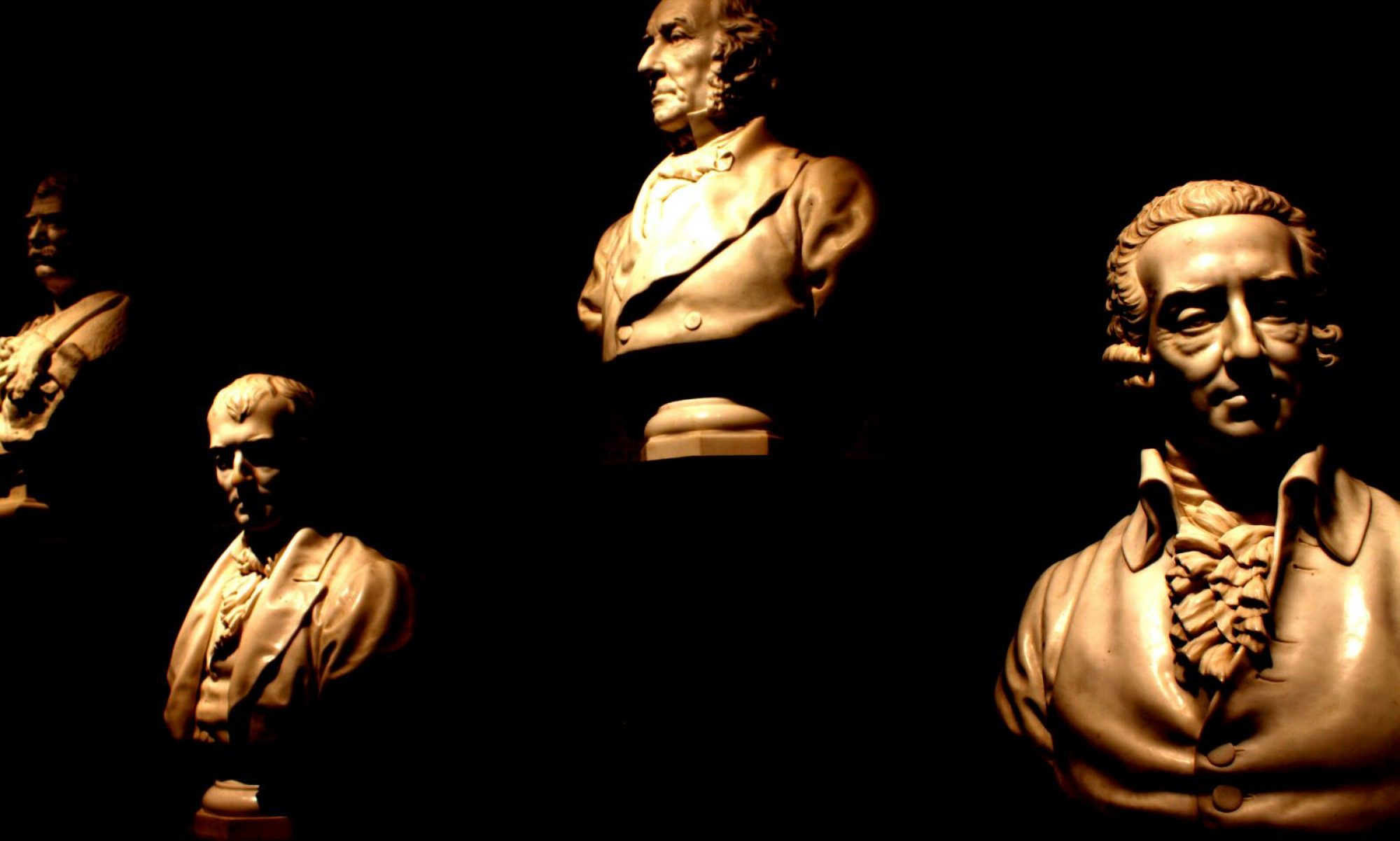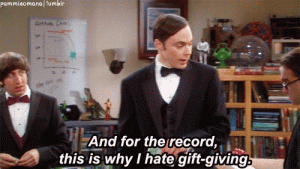– Wait, you bought me a present? Why would you do such a thing? (…) I know you think you’re being generous, but the foundation of gift-giving is reciprocity. You haven’t given me a gift, you’ve given me an obligation (…)
– It’s ok, you don’t have to get me anything in return.
– Of course, I do. The essence of the custom is that I now have to go and purchase a gift of commensurate value and representing the same level of friendship as that represented by the gift you’ve given me.
This is a dialogue extracted from “The Bath Item Gift Hypothesis”, a chapter of The Big Bang Theory (02×11) which is structured around Dr Sheldon Cooper’s response to the fact that Penny got him a Christmas present. What Dr Cooper seems to hate is not gift-giving as such (for instance, he didn’t hate the train that his grandmother gave him on season 9), but the obligation of reciprocity that accompanies it.
But what is reciprocity? An easy way to understand it is to see how it works in market exchange. Market transactions are reciprocal because A gives something to B in exchange for other something (rigorously, the transaction is over rights). In most of the cases, one of those ‘somethings’ is money. This is useful because money doesn’t just eliminate the necessity of double coincidence of wishes, but also allows people to make more exact calculations in the exchange (it’s easier to know how much money we want for a bread than how much cheese). A consequence of this is that the exchange can be completely closed after its celebration. As they don’t owe each other, there is no necessity of any relationship to the future. This is perfectly understandable: the market is mainly about the reproduction of rights and not about social relations (see Belk, Russell; 2010). Taking this into account, Cooper gets what reciprocity is: giving and receiving. In fact, according to the Oxford Dictionary, reciprocity came from Latin reciprocus, which means ‘moving backwards and forwards’.
However, is he right in thinking that gift-giving is reciprocal? Well, this is harder to answer. The first intuition is that he isn’t. We don’t expect a payment in trade for gifts in Christmas. We don’t expect barter also. Or do we? Belk (2010), after reviewing some of the main literature about it, thinks different. For him, gift-giving is ‘nonreciprocal in appearance; reciprocal exchange in practice’. Additionally, it’s ‘nonobligatory in appearance, obligatory in practice’. I think that he has a point. Let’s think about our birthdays. A and B are best friends. A gives B a wonderful and well-thought birthday present to B. Some months after, is A’s birthday. Should B bring a gift for A? If B doesn’t do it, should (or could) A get disappointed or angry?
These questions start to make it clearer. There is a gift-giving reciprocity which is different from market exchange reciprocity. We are not obliged to give gifts in the same sense that we are obliged to pay the price, because the payment of the price is a legal obligation that can be even required in courts, and the first one is a social obligation, with another kind of penalty for non-compliance (although market exchange is protected both by legal and social rules). Anyway, we have an obligation to give gifts and the right to receive them because we are part of a community with social rules that prescribe it. It’s a kind of exchange but coordinated by social rules instead of prices.
A second difference is temporal: market reciprocity is normally instantaneous, although we know that the compliance of any obligation can be delayed by mutual consent. This is totally in the line that market exchange is impersonal and do not seek for social relations. Gift-giving reciprocity works differently: it is not instantaneous (Christmas can be a special case) but it extends over time. We expect that people give us gifts as we give people gifts. It is an ‘expected’ reciprocity originated in the application of the same social rules and it coexists with social relations. As Bourdieu believed, gifts are different from barter because there is a time delay before the counter-gift.
A third one is related to equivalence. To solve his problem-obligation, Dr Cooper buys six gift baskets full of bath items of different sizes. His plan is composed of 4 steps:
1) To open Penny’s gift
2) To simulate stomach pain
3) To go to his room and see on the Internet the price of the gift.
4) To pick the basket with the nearest price and give it to Penny.
When Penny arrives, Sheldon says “Oh, good, Penny. You’re here to exchange gifts. You’ll be pleased to know I’m prepared for whatever you have to offer”. The gift is finally a napkin with a message for Sheldon signed by Leonard Nimoy, from Star Trek (and with his DNA). At the end, Sheldon just brings all the baskets and desperately says “I know. It’s not enough, is it?”
All this performance, besides that funny, seems weird. But why? This awkward social behaviour of going to the store, carrying the gifts, hiding them, simulating pain, look for the price on Internet, picking one and going back to the store to return the other gifts can be seen as analogous to transaction costs (costs of making economic trades, e.g. the cost of conduct negotiations).
Notwithstanding that the idea of transaction costs comes from Coase and it has been developed mainly by Williamson, it’s interesting to take this discussion from the approach proposed by Benkler (The Wealth of Networks, 2006, available here ), who uses the category of transaction costs to compare possible outcomes among markets, firms and social relations. Therefore, he complements the method used by Coase in ‘The Nature of the Firm’ (1937).
In a market transaction, people must determine its conditions as exact as possible in order to make it efficient. This is not simple as it seems because people need to work it very well at the margins. The same inside firms: to be successful, the managerial process must determine very well the what, who, when and how. But the framework of social relations works in a fuzzier way. Nobody would write clear conditions to give gifts, or to be generous with a friend, or to share something.
This has a consequence: although there is reciprocity in gift-giving, people do not look for exact equivalence between what is given and what is received. In this sense, it’s an imperfect reciprocity. This does not mean that there are no limits, but these are far more relaxed. We are not looking for equal value, but for, in Cooper’s words, “commensurable value” to reflect the relevance of occasions and relations. Furthermore, sometimes we can get back things that are hardly priceable. This is a comparatively lower cost in front of market transactions, considering that in them we act supposedly (and this is a huge assumption, given the development of the behavioural economics) as rational and self-interested people and, therefore, try to obtain as much as possible from our counterparty. This justifies here to speak of ‘negative reciprocity’.
The reason for this difference, I think, are the rules themselves and the motivations to act that they create in the agents. In gift-giving and other non-market economies, people are impulsed by social rather than lucrative motivations and then the necessity of determination diminishes. The objective of non-market economies is not to obtain the best possible price or the best possible deal, but the generation of social relationships and the fulfilment of the social obligations behind those relationships. Additionally, not being money the object, the comparison becomes harder.
Anyways, if we think Dr Cooper’s reaction was funny, it was not because of thinking gifts as obligations or because looking for a comparable value, but for saying it, for trying too hard to fulfil and for doing it as he knows: in the most socially deprived form.

